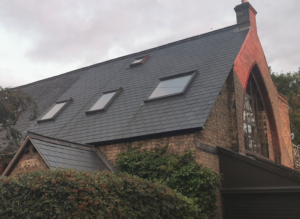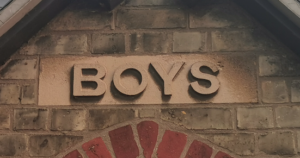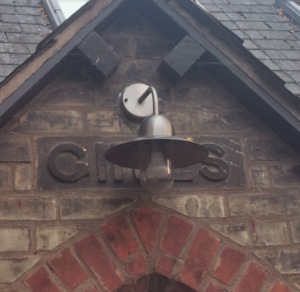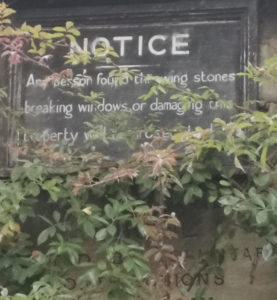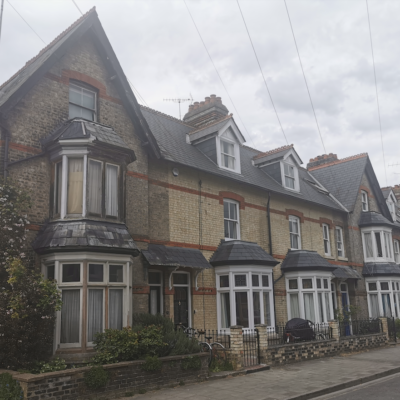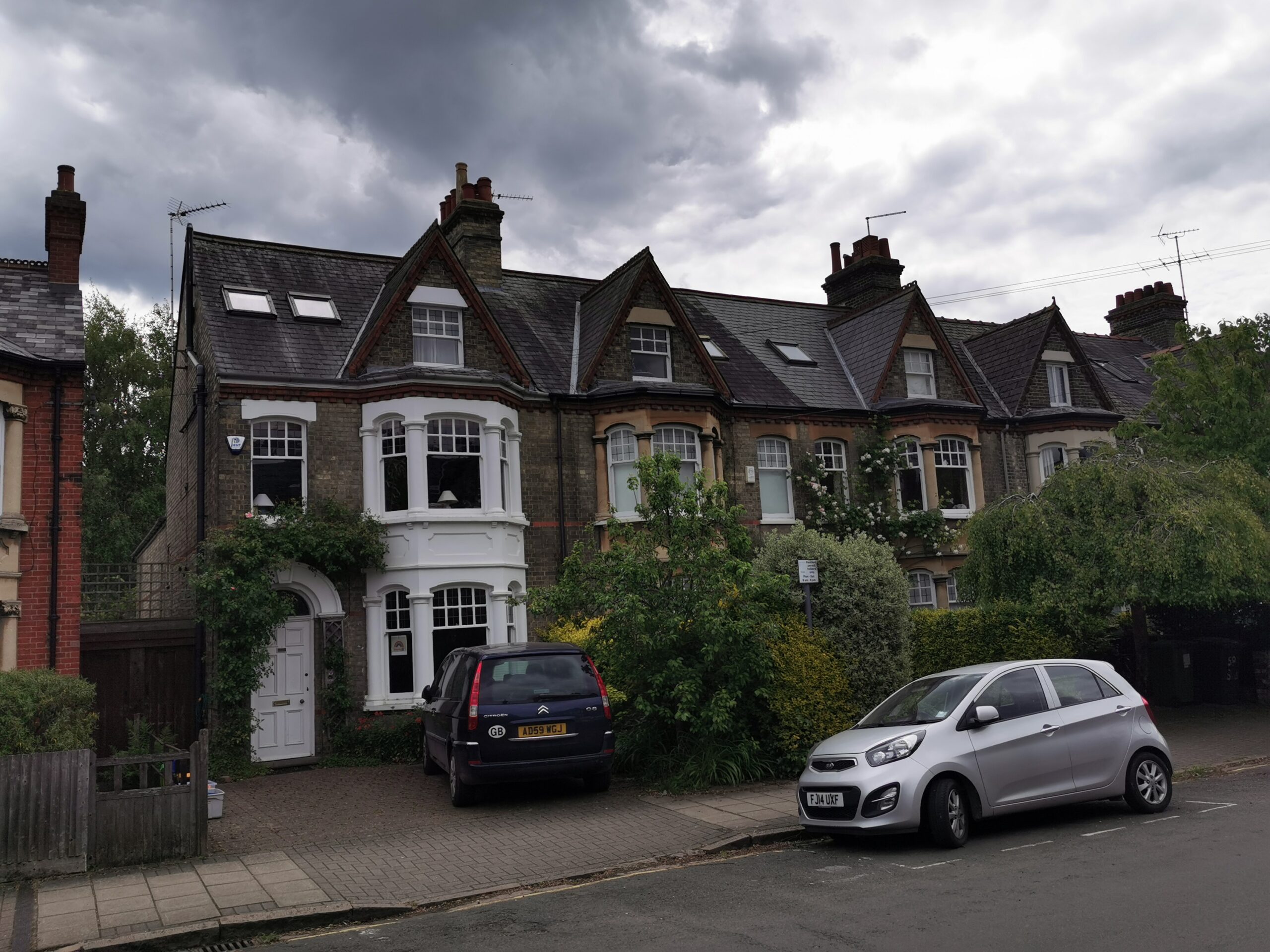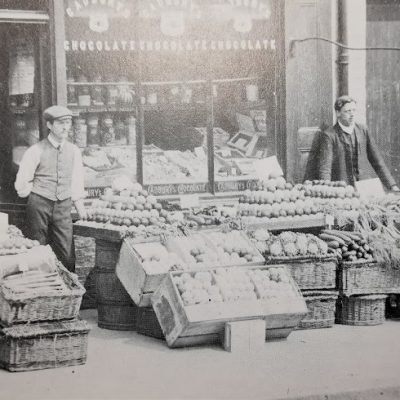Search by topic
- archaeology
- Building of Local Interest
- charity
- church
- crime
- dressmaker
- fire
- Great Eastern Railway
- Listed building
- Mapping Relief
- medieval
- oral history
- poverty
- Public House
- Rattee & Kett
- Religious House
- Roman
- scholar
- school
- Then and Now
- tudor
- women
- work
- world war one
- world war two
Search by text
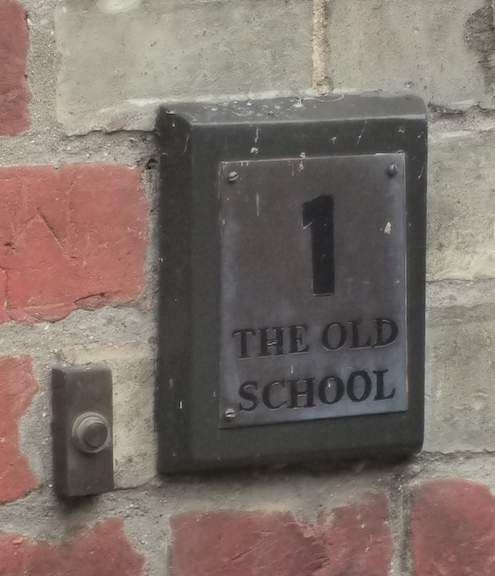 St Matthew's Infant School, Norfolk Street
St Matthew's Infant School, Norfolk StreetSt Matthew’s Infants’ School, Schoolroom
History of St Matthew's Infants' School
This is the site of the original schoolroom that was opening in December 1871. A lengthy account of this grand event can be found in the Cambridge Chronicle 23.12.1871. [SEE BELOW]
1880
Cambridge Independent Press 1/5/1880: an entertainment took place in the Norfolk Street schoolroom and comprised a programme of songs, rounds, recitations and instrumental music by the scholars and friends.
1901 School House
Charles H Cooper, 35, general smith, b Cambridge
Eliza E, 33, b Sussex
Charles H, nephew, 9, b Ely
1913
Mrs Hannah Bailey, headmistress
Charles Cooper, whitesmith, caretaker
1939 School House
Charles Howlett, b 1881, baker
Elizabeth, b 1891
?
?
Jack Krasny, b 1929
1962
St Matthew’s Church Hall
Charles Howlett (School House)
Listen to former Gwydir Street resident, Charles’s recollection of The Old School House.
Cambridge Chronicle and Journal Saturday 23rd December 1871
OPENING OF ST. MATTHEWS SCHOOLROOM, CAMBRIDGE. One of the most pleasing duties of week is to record the proceedings in connection with the formal opening of the new Schoolroom for that poor and populous ecclesiastical division Barnwell, designated the St. Matthew’s district, the Vicar of which is the Rev. W. Barham. This gentleman and his co-adjutors have laboured for the weal of the district with a zeal and energy that is alike honourable and exemplary ; and it cannot be a small cause of rejoicing to them, that they have the good fortune of seeing the result of their arduous exertions. According to one of the speakers at the ceremony, this particular part of Cambridge was the lowest in the social and moral scale twenty years since was in fact, “a terror.” But thanks to the Christian spirit of a few, by Divine help, the district has been rescued from that unenviable position, and is now “certainly not the worst the town.” Many can remember the small beginnings of this vast work — the band of two or three meeting together in the neighbourhood of Old Gas-lane; there has since arisen in the midst of the people a handsome church, and now a spacious schoolroom. For the history of the latter, and its objects, we refer the reader to the speech of Mr. Barham. The of the building is in Norfolk-street, a few minutes’ walk from the East-road. It stands on a slight eminence immediately at the back the Cemetery; and the visitor is fairly astonished entering at finding such a commodious room. The building, which partakes of the Gothic style of architecture, of white brick, with slated roof, is devoid of any great amount of ornamentation. The dimensions of the main room are 70ft. by 30ft., with elevation of 14ft. to the eaves and 27ft. to the ridge, thus giving a roof of 13ft. It will be readily perceived; therefore, that purity of air and ventilation have not been overlooked. The interior of the roof covered with match-boarding, which with the seven cross-beams, of Memel timber, arc simply varnished. At each end of the schoolroom is a triplet window, and four pairs of lights facing Norfolk-street. The floor is boarded, and at one end there is raised platform (20ft. by 7ft) clear of the entrance. The whole building is warmed by hot-air flues, laid flush in floor, and covered with iron grating. Upon each side of the seven beams is an appropriate text, worked in Old English characters, with illuminated capitals; these have a nice effect on the building. A class room (14ft by 20ft) is to be erected on the south side of the school room, with which there will be internal communication. The school room is approached from Norfolk- Street by two porches, and when the work is complete there will have been erected an iron palisading in front of it. The building is lighted with gas, and the main area will allow of the assembling of some four or five hundred school children. Its present use is that of a Sunday school, but it is hoped that a self supporting denominational day school will be established. —The combined offices of architect and builder have been undertaken Mr. John Dixon, of the Hills-road nurseries, and organist of St. Matthew’s church , who commenced operations on the 19th of July last; and considering that the four walls are of 14-inch work, and include such a comparatively large area, the workmen have not been tardy in their labours. The cost of the building is £400, that of the ground £144; of these sums there was still wanting, prior to the opening ceremony, about £160.
The opening of the building took place on Tuesday last, the proceedings commencing with a large tea-party, upwards of 300 persons being partakers of the refreshing cup. There were ten tables erected in the room, the trays being generously supplied by the following friends:—Mrs. Barham, Miss Leeke, the Misses Barham, Mr. Rivington, Mrs. Matthews, Mrs. Wilson, Mrs. Dixon, Mrs. Johnson, Mrs. Miller, Mrs. Speechley, Mrs. Ringwood, Miss Mallerson, Mrs. Wheaton, Mrs. Francis, Miss Parker, Mrs. Young. Miss Boyce, Mrs. Brown, Mrs. Barrell, Miss Moden, Mrs. Smith. Mr Simmons, and Mr. Houghton.
After tea there was sale of useful and fancy articles, for the augmentation of the Building Fund.
At about eight o’clock, which time some five hundred persons had taken their places in the school room, an intimation was given that the delivery of addresses would commence. In the absence of the Mayor (S. Peed, Esq ,) from indisposition, the chair was taken the Rev. Dr. Cartmell, master of Christ’s College, who was supported by F. S. Powell, Esq., late senior member for the Borough, Professor Babington, the Ven. Archdeacon Emery, Rev. W. Barham (vicar of St. Matthew’s), Rev. J. Martin, (vicar of St. Andrew tbe Great), Rev. E. T. Leek (vicar of Christ Church), Rev. W. H. Guillcmard. D.D., (vicar of St. Mary the Less), Rev. Mr. Smith, Rev J. T. Lang, Rev. S. E. Perry. Mr. Rivington. &c.
The Chairman who was sorry that through illness the Mayor could not take the chair, must be allowed to express the great pleasure he felt in being present at such a large gathering. The occasion was an exceedingly interesting one, calculated to produce good will and kindly feelings. What had been done was a great credit to the district and to its neighbours and he thought the school room in which they were assembled would prove an advantage and blessing to them all (applause). He more especially referred to the good feeling which at this particular period of the year we had towards each other; but all the subjects of Her Majesty the Queen, not merely in this country, had been moved in the deepest manner on account of the illness of the Prince of Wales, whose life for many days apparently trembled in the balance. However, after all the anxiety, it must be said that very great good has come out of what was at the time a very great trial. The depth of feeling manifested towards the throne had not merely been cheering to the heart the Queen, but bad been good for all (applause). It shewed the existence of a true spirit of loyalty, and how much there was to join us as a nation together. Dr. Cartmell here read the bulletin announcing the health of the Prince at five p.m. that day, that ” the progress was in all respects satisfactory,” which announcement was received with a hearty burst of applause. He learnt that Her Majesty had that day passed through Cambridge, and by one who saw her, it was not to be mistaken how deeply she felt the sympathy accorded her in her sorrow and anxiety. Her Majesty would feel it far more than any of her subjects could imagine. He had no doubt that this great anxiety would the source of great blessing hereafter and he trusted that in God’s good providence the Prince’s health would be perfectly restored (applause).
The Rev. Mr. Bahham, the Vicar, then gave a statement of facts in connection with what he might call a noble building — the schoolroom (applause). When entered upon the district as a curate, there was neither church nor schoolroom. Now they had both. Of course he could not lay claim to the production of the former, but he might say that the congregations steadily increased, and means of the offertory kept the Church going (applause). This was the only Church in the town proper which was worked on the voluntary system, and up to the present time had been great success. But no parish could flourish without a schoolroom. Therefore, when mentioned this necessity to Mr. Dixon, that gentleman once saw the way to it, and suggested a building of sixty feet by thirty feet, promising at the same time that if others would raise the funds, he would draw out plans, superintend the work, and undertake to see it brought a completion (applause). Plans were accordingly submitted to the committee and approved, for a building to cost £300. After the foundations were dug, it was suggested by a lady that it would be advisable to make the building trifle longer. This reasonable suggestion was fallen in with, and the building was extended ten feet. This necessarily increased the expenses, and the building altogether wonld cost £400. He thought it would be admitted that they had been successful in their enterprise, in that they had raised the money, with the exception of £100. Several of the congregation had rendered assistance, but he must acknowledge that their friends of the University had almost built the room (applause). He should be glad if they were accorded more assistance from the town. Mr. Barham here paid tribute to the indefatigable exertions of a member of the choir in producing the ingenious mottoes on the beams. The original intention of the building was that it should used as a schoolroom, and place for entertainments of various kinds. Such a schoolroom was very necessary, from the fact that their Sunday School had increased from [??] to 200, with the probabilities of increase. However, although originally designed for Sunday School, the building might be used as a day-school, in which case the instruction would be plain and sound, with religion as a prominent element (applause). No application for assistance had been made to the Government, because he wanted to have a day school, if one at all, under his own superintendence, so that he should be satisfied that no elements of a corrupting nature might be introduced. But if it were to be a day-school, it must be self-supporting, or in other words, the parents of the children must provide a stipend for the master. It would not be sectarian school, but children of parents of all denominations would be admitted. They must, however, all submit to the same kind of education, which would include the teaching of the Church catechism, for he felt that there was nothing therein that was not calculated to make any man faithful to his Queen, dutiful to his parents, and honourable to his country (applause). The Ven. Archdeacon Emery was the next to address the assembly, observing that as one went through life he was subject to great many surprises, and he confessed that upon entering that room he was subjected to great surprise, for he had no idea that he was coming to such a beautiful room [applause). The surprise, however, was most agreeable; and he was sure that the inhabitants of the district, and those who had contributed to the building, must feel the greatest gratitude to Mr. Barbara and to Mr. Dixon,
{the next section is illegible on the BNA scan]
Ids apt pupil [applause]. What was now wanted was that the inhabitants should do their best to make the building as useful possible for the promotion of the temporal and spiritual interest of all parts of the parish; and to that their hearts must be in the work. He was very glad to hear Mr. Bar ham’s statement that, he did not intend get up a stipend for day-school master, because he had already a great deal to dr, spiritually, iv his district. Still, their Vicar would ready to give advice in the matter. He (the Archdeacon had no doubt that this schoolroom might be made very useful for day-school as well as for its original design. How thankful they ought to be on seeing how God had been pleased to bless and promote the work of his servants. When their dear departed friend, Mr. first undertook to use his endeavours to get chinch for St. Matthew’s district (which the Yen. Archdeacon believed helped to shorten his days), he doubtless had idea that the church would be so soon finished, and grand building like that sehoolivom would so quickly follow it. The speaker then proceeded to suggest the holding fatheta* mothers’ meetings in the schoolroom, and deduce some excellent advic’i from the various mottoes on the beams, urging his audience “not to judge hastily,” and to follow the injunctions—”wives obey your husbands,” ‘• Husbands, love your wives,” and ” Waste not, want not.” It was one of the most startling things in life, and one that taught humility, that the more one did the more he found to do. That was the ease with Mr. Barham, who by this new erection would double his work in the future. In conclusion, the Yen. Archdraton trusted this schoolroom
[The scan is legible from this point]
would tend to unite all together in one resolve to live holily and happily, loyally to the Queen, honestly and honourably to their country, and above all, faithful to their God and grateful to their Saviour [applause] They of the clergy, whilst feeling it to be their duty to do all they could for the moral and social happiness of their people, still maintained that the best thing they could do for them, both for this world and the next, was to lay at the basis of all other education the fear of God [applause].
The choir here rendered the national song, “God Bless the Prince of Wales,” the whole company standing meanwhile, and joining heartily in the chorus.
Mr. F. S. POWELL, being introduced by the Chairman, was received with loud applause. Before proceeding to submit the observations which he should venture to make, he desired to perform a duty as the guest of their worthy Mayor, and to repeat the apologies on his worship’s behalf, already given from the chair, for his absence. It was Mr Peed’s intention have been present, but the present state of his health, it would have been rash act if he had attempted to have been present at that meeting. After the eloquent addresses they had just heard, of the work done and the hopes entertained of the future he did not think it necessary to enlarge upon details of that character, but he must be allowed to mingle his congratulations with those of the speakers preceding him and of the audience, and express the joy and happiness he felt, finding in this district, such a building which seemed to have arisen as if by magic and which the hands of Providence was sure to become Instrumental for the improvement of the population already gathered and to be gathered around its walls [applause]. He confessed that it was not without a sense of emotion that he was where he was that night—that was addressing a Cambridge audience after a long absence on the western continent; and he confessed to a sense of cheerfulness and content in being once more at home [applause]. He did not think he could better occupy their time than in relating what he had seen in North America and the United States. He saw nothing of the schools in Canada, because at the time of his visit the vacation was not then at an end. But on crossing the frontier be found schools in session. He had had the opportunity of visiting a great number of schools – from the Atlantic shores across a great belt of country the western slope. There was throughout the Northern States a system of free schools maintained by public taxation, with the common principle that the same instruction was to be given to all classes and to all creeds. All those of the white race assembled in the same room, and side by side sat the child of the rich and the child of the poor—the child of the emigrant and the child of the citizen who could trace his lineage back to the Pilgrim Fathers. Whether it was of advantage or not, that all classes of society should so assemble together and receive instruction in common, he confessed he did not feel himself at liberty to express any opinion ; but this he had found that, (saving and excepting families who were their own estimation or the judgment of others far better than others), the great majority of boys did attend these schools, whilst as to girls from more cultivated homes, there was considerable doubt on the minds of their parents as to the advisability of their attending the common schools. Another characteristic common to these schools was, the breaking up entire schools into small classes. Their rooms on an average contained about sixty children, with one teacher. Another feature which they had in common was that, where the population admitted of it, they had large schools of between 500 and 1500. Doubt might expressed by those who had charge of children in this county whether discipline could be maintained in such school. The answer could be given, that under their system admirable discipline could be maintained. The next feature would he believed send a shudder through the ladies before him, which was that in the American schools (and he greatly regretted it) no sewing was taught the girls. Mr Powell spoke to a lady as to whether she had not doubt as to the wisdom of such a policy, and she replied that she should much think of teaching cooking in school as sewing. Upon these points he differed with the lady, thinking that girls should be taught to sew well and to cook too [applause], for if so taught he ventured to say that more artisans and working men would be at home to dinner, and fewer would take their supper in the public-house [renewed applause]. These were the main principles they had common in America, but there were certain significant differences. San Francisco there was a tendency to teach boys and girls together, whilst the division of sexes became more popular on advancing to the eastern districts. As regards the subjects of instruction, an important item for educationalists, he found that in the east, where education had been longer studied and the art of teaching better known, there was a less ambitious programme of studies than was found in the western or younger states. The former had discovered that to produce a sound education, there must first be laid a firm foundation: the pupil must brought to completely command the elements of leaning, and then may be led gradually on to a more complete course of studies. In the matter of discipline there was difference. In San Francisco a schoolmaster with much pride showed the speaker a school of 1,400 children where corporal punishment was unknown. On the other hand the school board of city the Atlantic coast was most anxious to abolish corporal punishment, but the parents objected to the proposal, on the ground that such boys as theirs would never be taught without the birch (laughter and applause). It was not without a feeling of anxiety that he inquired into the state of things in the city of New York. There they had abolished the rod, and the result was that, according the statements of many schoolmasters, the masculine youth of the city absolutely refused apply themselves to their studies. The following pathetic lamentation on this point appeared in the New York report of last year:—”lndeed, so much time, many teachers say, is taken up, and their energies exhausted to such a degree in preserving order – in keeping their pupils quiet—that they have little of either left enable them to give sufficient instruction.” The consequence was that the abolition of the birch was followed by system of expulsion of incorrigibles, which was resorted to on a large scale. Again, Mr. Powell found there to be a difference to religious teaching. The largest amount of religious teaching he found in the schools of Chicago, where school was opened with the reading of a passage of Scripture, a simple prayer, and the singing of a hymn. In St. Louis, religious instruction was absolutely forbidden by enactment ; and in Cincinnati the same abolition was enforced. But there, a very interesting struggle was taking place before the courts of law, the question being raised as to whether -that being a Christian state – it was competent for the school authorities or any other authority to prohibit religious instruction in the schools. Meanwhile, the question was pending, and the issue was awaited with much anxiety. In New York, each school was allowed the option of choosing whether the duties of the day should be prefaced with the reading of a portion of Scripture, and, with one exception only, every school had adopted the practice of reading a portion of Scripture as the commencement of the daily operations. [applause] There was, further, considerable difference in these States as to the freedom of the parent to educate his child or allow it grow up in ignorance:
[The scan is unreadabe from this point on the BNA]
but Mr. Powell rejoiced to see that there was growing sentiment in favour of compulsion [applause 1, and that the Americans were longer willing that their children should grow up ignorance and vice because parents were careless. There was also great difference to be found the character of tho buildings wherein the pupils were educated. On this point many visitors to America had fallen into great mistake. They asked to see the schools, and were show n over the noblest schools the city afforded. In Chicago the superintendent conducted Mr. Powell over a beautiful school filled with children of whom any one might be proud; nnd he observed to his cicerone, “AVhatyou are showing me is model school; I desire to see “the ordinary school of the place.” The gentleman then took him to school of Bohemians, that was, school of the children of Germans lately arrived in America, who were the most difficult subjects any teacher could have in charge; and it was certainly with pleasure and surprise that he found these comparatively rough children, housed in a building not less noble than their brothers and sistei,< just spoken of. And although there was certain degree of rudeness and roughness these young recruits, still the discipline was as complete as was that where the children of the richer parents were gathered together. Amongst other characteristics of the American people, and particularly at New York, there was cultivation of the esthetic faculties, and the speakor described a pleasing scene he witnessed where he watched the children march from their class rooms to the sound of the piano; 400 children were thus seated before him, the folding doors were then withdrawn, and group of 500 little children with their hands upon their heads were brought to view, upon whom streamed the rays of the bright sun after passing through a skylight, with beautiful back-ground to the children. A more gratifying sight was never seen any persou, however long his experience. It was truly touching and glorious sight [applause.] But there wero sights still more touching. had stated that the Americans desired to gather together the same room children of the white race: the time had not yet come, the opinion of philanthropists, to gather together the white and coloured children. However, he had the same opportunity of seeing the coloured children’s schools, and their places of worship also ; and it did occur to him with strange intensity of force What a blessed thing it is that these little children’ so receiving instruction and receiving it with so much effect, and eagerness, and love, should no longer be born to slaves. If the late American war had never occurred, or had had a different termination, every one of these poor children would not have been the sons of free men, and themselves free, but the children of slaves and themselves slaves. Instead of which, these children were now receiving instruction which so far as it went was souuet and wholesome, and such was sufficient to develop their young faculties, and make them good citizens of a country which had conferred upon them such boon. These details might be considered wearisome and prolix, but those who took an interest in popular education—and who was there present that did not—would doubtless be glad to hear what was being done across the Atlantic [applause]. It washy means of these schools that the continuous tide of emigrants was moulded into one nation, and that the popular institutions became safe America. They say, one and all, we trust the people with power; if the people are ignorant we shall have anarchy, disturbance, disorder, rapine, pillage, and every phenomenon misgovernment. But, they proceed to say, we teach these children to think—to exercise their fa ulties, we teach them early life to gain a knowledge of things around them, and thus find our institutions are safe, spite of the vast numbers of not the best class of emigrants who are continually being discharged on to th<* American shores from the European Continent applause!. But, said Mr. Powell, it would be observed that thero was a gr»at omission these American schools, which might bo necessary under the condition of the problem there, but was not England. He referred to the omission of the religious element. The maximum, he had pointed out, was short lesson in the Bible, read but not explained ; the minimum was absolute abolition. Now, Mr. Powell believed that the people of England desired
[The scan is readable from this point]
that their children should be taught the facts of the Christian religion in day schools as part of their education [applause]. They spoke of Church and State; what they meant was in one sense that religion is to be preserved from fanaticism, and that the duties of our citizenship should be discharged in the spirit of Christians. They did not consider that the citizen was to ignore religion, or that the religious man was to live wholly for another world, forgetting this. That mixture ought to exist in every schoolroom. He believed the separation of it in the daily life of the citizen was injurious to the community; and as with the adult, with the child, for he conceived that such a separation was not good for the development of the child’s young nature. He hoped therefore that the people of this country would maintain denominational schools. There should be no shrinking, no doubtfulness in the matter. The secular education should such as would surpassed by none, but at the same time that this instruction was being given, there should be lessons in religious subjects on each day of the week [loud applause]. If such were case, our country would safe, because each individual citizen would do his duty. They might depend upon it that, although the prosperity of the nation did depend in eminent degree upon the political institutions which existed, and upon the issues of councils in Parliament, nevertheless that prosperity could never be secured, nor the happiness of the country rendered permanent, unless each individual citizen was made worthy of his high calling by a complete education such as he had described, namely, education where the duties of the citizen being those of Christian are kept continually in view, it being impressed upon the mind of each that he is a citizen and a Christian also.—Mr. Powell resumed his seat amid loud applause.
The choir here sang, “The Chough and Crow,” the soloist being Miss Julia Barham.
The Rev. Dr. Guillemard expressed his congratulations at what had been effected, and said that when the Board of Education was appealed to for a grant, a number of difficulties presented themseIves. But such were the exceptional circumstances of the case, that although the Board had never given a grant to a school for simply Sunday work, the urgency was so great and the intent so good that they gave a subscription. He had personally watched with anxiety the progress of the work, and now must acknowledge that never was money so wisely bestowed or so well laid out [applause]. The rev. Dr. then proceeded to depict the humanising influence which the building was intended to exert over that neighbourhood, by the means of intercourse which it afforded, and the Christian brotherhood which it was calculated to promote. The meeting of that evening he took as a happy augury of many future meetings.
The choir here sang The Dawn Day.”
Professor Babington next addressed some very suitable remarks to the audience, impressing upon them that union was strength, and calling upon them to try their utmost to promote every good work in that parish. The great change in the district had been effected by this union. Their friend, the excellent minister of the parish, and others who had assisted him, had done a great work. They had converted the worst district in this town into one that stood high. proof of this he referred to the state things which existed in the neighbourhood of Old Gas-lane twenty years ago.
The Rev. E. T. Leeke spoke of the great benefits accruing from the formation of this district, and proposed a vote of thanks to the Master of Christ’s College, for presiding.
The Rev. J.Martin seconded this proposition, and congratulated Mr. Barham upon the excellent choir he possessed. He hoped Mr. Barham would ere long be afforded clerical assistance, for there was no man in Cambridge more deserving of the sympathy of the people. An appeal was shortly made for this purpose in the various churches of the town. In connection with the history of the district, he mentioned the name of Mr. Ringwood who with others had been energetic in promoting every good work in the parish.
The motion having been carried,
The CHAIRMAN, in acknowledging the vote, repeated that it gave him great pleasure in being present; and said he could not too strongly express his admiration of the efforts which had been made to bring about this great work. He had known Mr. Barham a great number of years and always felt the greatest respect for him. He hoped a vote of thanks would be passed to the vicar.
Archdeacon Emery thereupon proposed hearty vote of thanks to the Rev. Mr. Barham, the respected vicar of St. .Matthew’s, whom he trusted would receive frequent assistance from members of the University.
Mr Ringwood in an interesting address, seconded the resolution, which was carried with acclamation.
The Rev. Mr. Barham. in the course of his acknowledgment, said the district was much indebted to Mr. F. S. Powell for coming there that evening [applause]. Mr. Powell was known throughout England for his liberality, and he had shown his interest in education that evening by giving them a donation of £10. [applause]
Mr. Powell proposed a vote of thanks to the architect and builder, Mr. Dixon, and spoke of the indefatigable manner in which that gentleman worked for the cause.
The CHAIRMAN seconded the resolution, observing that Mr. Dixon well deserved the thanks of the parish.
The motion was carried with much applause.
Mr. Dixon, through the Vicar, expressed his willingness to devote his future energies to the welfare of the district.
The pleasant proceedings terminated with an anthem, ” Praise the Lord, O Jerusalem,” (Scott) and the National Anthem.
Contribute
Do you have any information about the people or places in this article? If so, then please let us know using the Contact page or by emailing capturingcambridge@
License
This work is licensed under CC BY-NC-SA 4.0





